High Maintenance Turns 10: An Oral History of HBO’s Pot-Scented Anthology Dramedy
- Oops!Something went wrong.Please try again later.
The post High Maintenance Turns 10: An Oral History of HBO’s Pot-Scented Anthology Dramedy appeared first on Consequence.
In November 2012, three industry professionals with a deep appreciation for pot launched a “fun weekend hobby art project” that changed not just their lives, but the people they collaborated with.
High Maintenance originally launched as a short-form web series hosted on Vimeo, because the intention of executive producers Katja Blichfeld, Russell Gregory, and Ben Sinclair was to provide a showcase for under-appreciated acting talent either represented by Gregory (an agent) or discovered by Blichfeld (a casting director who was then working on 30 Rock).
“I found that there’s no lack of interesting talent in [New York],” Blichfeld tells Consequence. “And I luckily got to cast a lot of those people on 30 Rock. But that feeling of an abundance of riches out there, there being so many actors who I found interesting and inspired by, really was a big catalyst for creating High Maintenance.”
Structured as an anthology, individual episodes focused on the many different clients of a bike-riding weed dealer known only as The Guy (Sinclair), and even during its independent days, the creative team were able to attract known performers like Dan Stevens and Hannibal Buress, along with rising stars like Michael Cyril Creighton, William Jackson Harper, Max Jenkins, Greta Lee, Britt Lower, and Heléne Yorke — many of whom now credit their current success with the showcase provided by their episodes.
To celebrate the show’s 10th anniversary, Consequence spoke with Blichfeld, Sinclair, Russell, and many others involved with the series during its wild eight-year journey. While technically, that journey is done, as Blichfeld says, “never say never about anything.”
“We Were Trying to Showcase Their Humanity”
Blichfeld’s career as a casting director began, believe it or not, with a teen idol.
Katja Blichfeld (Co-Creator): When I was a pre-teen. I had a big crush on Christian Slater. So, of course, I knew everything about Christian Slater back then, and among the things I knew was that he had gotten his start through his mom, who was a casting director. So I put two and two together: “Oh, there are people in the world who are responsible for working with talent and placing talent in roles.” I didn’t really have a full understanding of all how it works, but I probably just thought, “Oh, cool. You get to hang out with the likes of Christian Slater.” [Laughs]
Russell Gregory (Executive Producer): I had worked as a talent agent for about a decade, and when I was an agent Katja was doing a lot of casting for 30 Rock, which she won an Emmy for, and I was always pushing my clients for that show, like Bridget Moloney and Heléne Yorke. So I had a handful of clients that Katja knew very well, and we were hanging out with Ben, talking and telling stories. And I had decided that I was going to quit my job as an agent and become a talent manager, because I also wanted to try my hand at producing.
Blichfeld: I didn’t really fancy myself a filmmaker or anything like that at that moment. I just felt like a storyteller. But I would definitely not have given myself the label of writer, director, producer — any of that stuff — at the time that we conceived of doing a web series.
Gregory: That was part of the point, was to give these people that didn’t have the opportunity to do episodic television or film that really focused on them and their abilities. When they did an episode of High Maintenance, we had this perfect little capsule of their work that we could just present to people and say, “Hey, take a look at this.”
Ben Sinclair (Co-Creator/”The Guy”): In a way, we were trying to dignify types, and look past the superficial nature of type and look into their deeper human quality. There was so much weed involved, I don’t know how conscious we were of that. But I do know that we weren’t seeing the depth of the human experience on TV that we experience in our lives. So I think we were trying to give these actors… We were trying to showcase their humanity. And that was nice.
Blichfeld: We thought, “Well, this will be cool, and Ben will get some footage of himself playing something other than, you know, a crazy guy, and maybe that’ll be good for him.”
Gregory: One day they called me and said, “We have this idea for a web series that is about a weed dealer, where you really only know as much about him as his clients do, because it happens so quickly — we want to film it in real-time.” I don’t remember the exact conversation, but that was where it was born. And it really rang true to me. I was like, “Absolutely. Whatever you guys wanna do, let’s do it.”
Blichfeld: It was just sort of intended to be this fun weekend hobby art project. I wanted it to just be a place where I could write for these talents that I found interesting, Ben primarily. We had met not even really that long before — we had, I think, been married not even a year when we started actually conceiving of the show. But even since our first date, we were spitballing ideas for projects. And so it felt destined that we were going to do something.
Shaka King (writer/director, Season 2): I was in grad school when the show started, and a bunch of my friends and classmates were crewing on the web series. And I was highly aware of it because I was making my first feature [Newlyweeds, his M.F.A. thesis project at NYU], which was also a weed movie. So there was a certain level of, “What’s going on over there?” And then I got to see the show and I was like, “Oh, this is really amazing.”
Max Jenkins (“Max”): I met Katja when they were casting 30 Rock, right before they won an Emmy for it. We got each other deeply — we both have these naturally broken hearts that we can’t help but lead with. Anyway, they put me in 30 Rock, and then I ran into them at a screening of Clueless at BAM and they asked me to be in the web series they were writing.
Heléne Yorke (“Lainey”): Russell was saying, “They’re thinking about writing characters for you and Max Jenkins,” because Katja had cast both Max and I in separate different episodes of 30 Rock. It was like, “Would you wanna come and do this for a day? It’s gonna be at Katja and Ben’s apartment down in Ditmas Park.”
Jenkins: Katja and Ben wrote these fucking funny characters, somewhat loosely inspired by the iconic Bravo masterpiece Gallery Girls, and Heléne and I were instantly able to drop in. I mean, they cast us for a reason. That’s Katja’s genius as a casting director, and basically the entire High Maintenance ethos: Write the characters our favorite actors would dream of, and then cast them.
Yorke: I met Max and we instantly connected, and we filmed [the episode] in this one day in Katja and Ben’s apartment. I don’t even know if they rented equipment — crafty was literally Trader Joe’s snacks that Russell provided.
“My Fart Was Real”
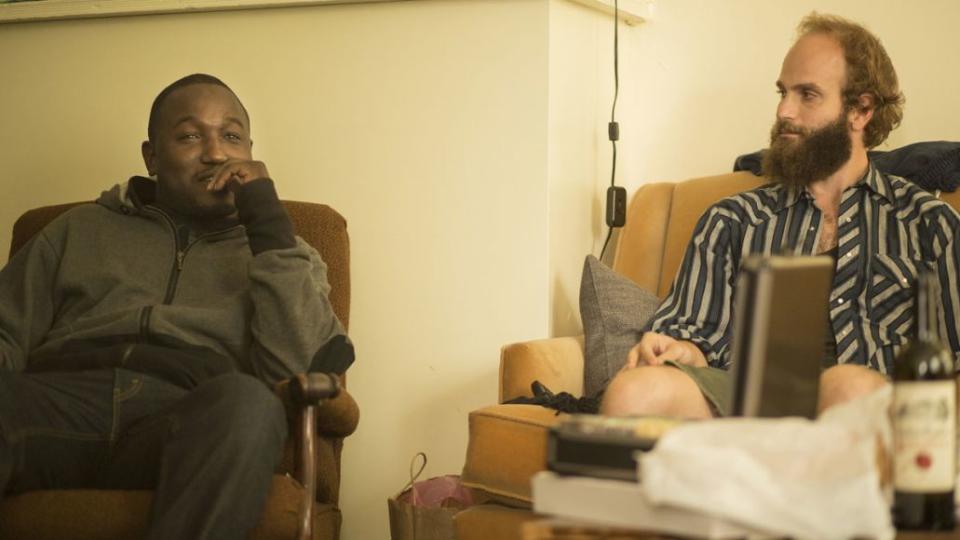
High Maintenance (HBO)
Comedian/30 Rock writer Hannibal Buress, who also now raps under the name Eshu Tune, ended up being the first of many high-profile performers to appear on the series.
Hannibal Buress (“Hannibal”): I reached out to them about doing the show — I think my friend Carlen Altman had maybe posted it in her Google chat or something like that, and then I started watching it and then I reached out about doing it. It’s actually interesting thinking back on that, because that was when I was still excited about acting. [Laughs]
Blichfeld: I would credit him with giving us some cred. Getting anyone really subsequently, I think, was due to just Hannibal saying he would do our show. He wrote an email one day and was just like, “Hey, I’d love to do one.” And we were just like, “Oh my God, we now we gotta write something good enough for Hannibal.”
Buress: And then they developed an episode for me that was set in my actual apartment.
Gregory: All those locations in the first few episodes are all either our apartments or the apartments of our friends and the actors.
Buress: It was only one day, but [the apartment] was not made for that. That was definitely the most people that’s ever been in that space. It’s a two-bedroom railroad in Williamsburg, so yeah, it is narrow as shit. You just stretch your arms out and it’s crowded in that motherfucker by yourself. But once we started shooting, it was cool. I’m glad we did it. There were some moments in there that I had to try to dig deeper for. So they definitely allowed me a space to push and challenge myself a little bit.
Blichfeld: Our way was to cast people as something that didn’t feel too far removed from who they are, and trying to showcase the thing that they do best, so it felt like a no-brainer to have him play a comedian. And luckily he was down to sort of do this meta version of himself. He was beyond generous. That was really a fun process.
Buress: My fart was real. [Laughs] That’s when I knew that the show had a great future for it and was gonna probably get picked up by a major distribution platform like HBO, is when I farted in the scene, and they embraced that and used that. Honestly, that’s when things started to take off for both of us, if you look back at the timeline. If you track just the arc of our careers from that fart until now, it’s up and to the right.
After Buress, the web series featured an increasing number of known actors. This included a future Beast, who would play a genderqueer screenwriter in multiple episodes.
Blichfeld: Dan [Stevens] reached out to us on Facebook, I think — he had just been on Downton Abbey, and then he came to New York to do a play, and one of his castmates was a former client of Russell Gregory’s. And so, I think he pieced that together somehow, and he was a fan. We were a little starstruck. I mean, we were totally Downton Abbey fans, but then, we met up with him and we just clicked on a personal level. He’s actually still a really good friend of both mine and Ben.
We didn’t have an immediate idea about who he would play. But at the same time, other people in the world were reaching out — Rachel Comey, a fashion designer who I was a big admirer of, wrote us some fan mail too, and offered up her brand for resources. At that time, we had this desire to portray a non-normative family situation with respect to gender, and we had the inspiration that Dan might look really great in some Rachel Comey clothes. It was a collaging of ideas that had been kicking around and resources that had been offered to us.
“Oh Good. HBO Has Taste.”
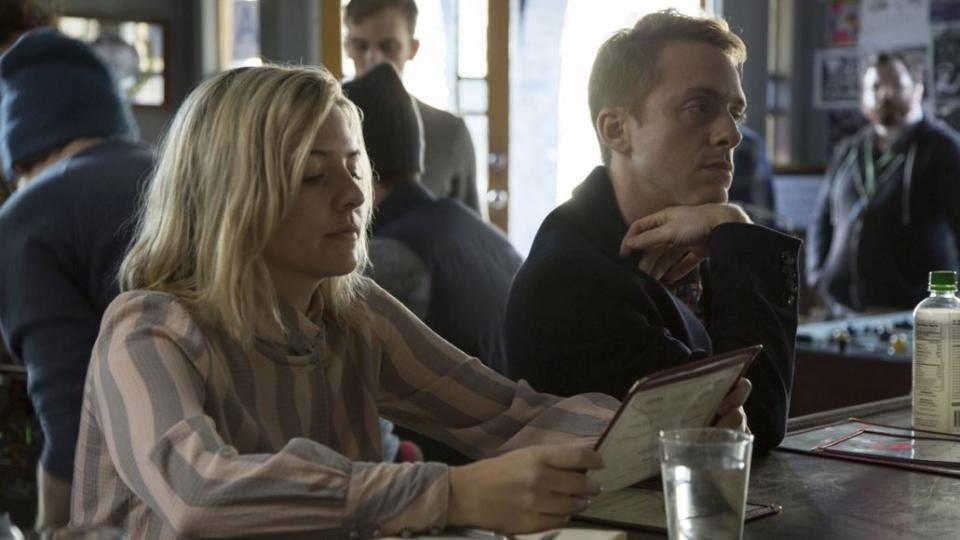
High Maintenance (HBO)
Early in the show’s existence as a web series, the creators were approached with the opportunity to develop the series for FX. But it didn’t work out.
Blichfeld: It wasn’t a super fun process for us. It just felt like it was changing too much, more than we wanted it to change. And we had just only started figuring out what we even were. So the timing was just off — that is very clear to me in retrospect.
Sinclair: They had us in development for a year and then unceremoniously let us go.
Blichfeld: And while we were caught in that period of time, trying to develop something that FX would greenlight and failing, I remember there was a moment where we thought, “God, wouldn’t it just be cool if we could just keep doing it the way we’ve been doing it, but with just a little bit of money?”
Sinclair: And that happened to come when Vimeo announced that they had money for original programming. So essentially, we went to Vimeo at the IAC building and stepped into the president of Vimeo’s office, and then a deal came together. What they were already planning on doing with creators is giving them 100% creative rights and the IP to their projects. We said, “Sounds good to us.”
After producing six episodes of the show for Vimeo on Demand, the producers chose not to continue that deal. Instead, in 2015 (specifically, on April 20th), HBO announced that it had picked up High Maintenance — not just bringing the original web series to the network’s streaming platforms at the time, but commissioning a new six-episode season.
Nina Rosenstein (EVP, HBO Original Programming): I remember stumbling upon High Maintenance on Vimeo when it first came out as a web series, and like everyone else, I fell in love with everything about it. It was a gem—the characters, the vibe, the love letter to Brooklyn, but mostly the range in storytelling, from heartbreaking to hilarious. I felt it would be a good fit for the network because it offered something truly beautiful and unexpected, and so I pursued Ben and Katja with almost stalker-level perseverance until they agreed to meet.
Yorke: It’s funny — you’d like to say, “Wow, I was so surprised.” But I wasn’t. It’s just, yeah, this deserves a broader audience and a legit platform that’s gonna put it out there. I think more than anything I was like, “Oh good. HBO has taste.”
Sinclair: HBO was really speaking to us in terms of keeping it going as it was and not rebooting it as something else. Of course, there was a little bit of a reboot feeling, because of the nature of half an hour versus shorts, but we tried to just keep doing what we’ve been doing as much as possible.
Gregory: I was a kid in the ’80s, and HBO was the only thing that had any queer content, and in college, I was always watching Kids in the Hall on Friday nights, so I knew we could be weird on Fridays and get away with it. We all felt pretty confident that this was the place. They take care of their artists there. And they also made us very comfortable. Our executive there, Nina Rosenstein, was very upfront and just said, “We don’t want to mess up what you guys are doing. We want to continue it.”
Rosenstein: I tried to allay their fears that the “network” wouldn’t mess with their process or ask them to change the elements that made it so unique. We wanted them to have the resources to tell stories that they may not have been able to, while always retaining their original vision.
Blichfeld: I think they made a joke like, “Well, we don’t want people saying, ‘We fucked up your show.'” They were very hands-off. We had a very, very modest budget — I sometimes wonder if anyone that does narrative stuff on that network has had a lower one. Because it was pretty, pretty low. But I loved that we were a small-budget show because I think that is ultimately what kept us true to our tone.
Gregory: [In Season 1], my favorite episode is “Tick,” with the can collectors. Bridget Moloney is also in that — she has the raver dad and they’re all living together. I really enjoyed that piece that first season. “Tick” was originally supposed to be the first episode, but it was such a departure from what we normally do and the way that we told the story that they felt like it wasn’t necessarily the way we should start out our HBO run. They changed it [to “Meth(od)”], with the jacked-up workout guy that turns out to just be an actor.
King: That first episode [of the HBO show] was so insane to me. I loved it. I was like, “Oh, this was the right move and this show’s gonna work really well here.” It all made sense to me. I was a big fan of the first season, which is why I was so excited to come on board in the second one.
Buress: When it went to HBO, it was cool to see how they recreated my apartment. They had all the little various messes. That was really trippy to see.
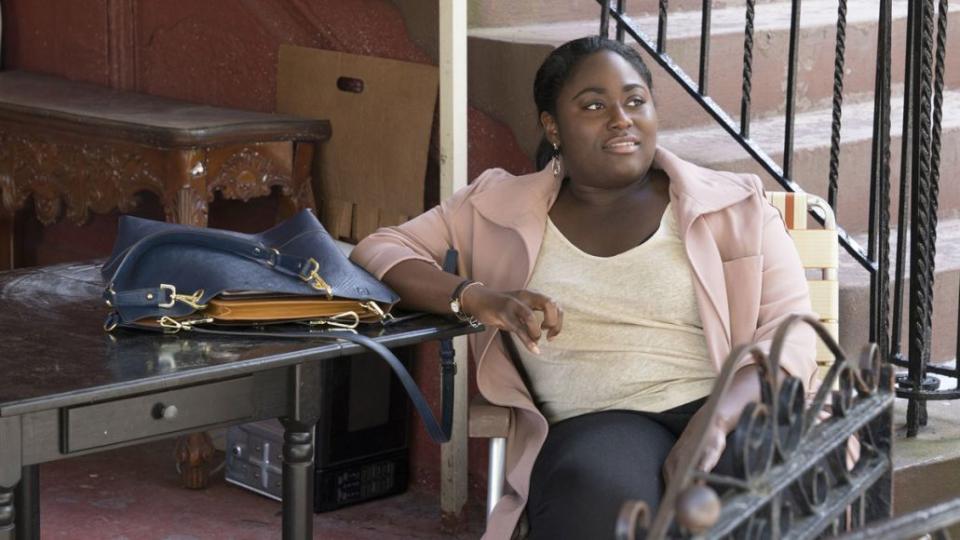
High Maintenance (HBO)
Blichfeld and Sinclair wrote and directed all of Season 1 themselves, but there were some changes for Season 2. For one, their marriage ended in an amicable divorce after the first season. (Blichfeld has since come out, and uses she/they pronouns.)
In addition, the show brought in additional writers and directors, including a future two-time Oscar nominee.
King: I directed two episodes of People of Earth [in 2016] — that was my first professional TV directing work. And fairly soon after that, I remember talking to my agent at UTA at the time and was also Ben and Katja’s agent, and she put us together and I remember we sat outside at some kind of coffee shop, and after that conversation, they were like, “Yeah, I think we might want you to come on board and work with us in some capacity.”
Rosenstein: They assembled a truly gifted group of writers, directors, and crew, and made some pretty cool episodes along the way.
King: They’d never run a room before, and the way that they did things wasn’t the way that things are traditionally done. And so it was kind of interesting because I didn’t have a lot of experience — it was my first writer’s room, actually. So we were all kind of fresh, which I think worked for Ben and Katja because none of us were like, “Well, this is the way things should be done.”
Blichfeld: I think I just like [Season 2] the most. That was the first season we had writers, so just having that infusion of other perspectives and experiences and writers, to actually physically write stuff, was a really big game changer. We were still new enough in television making not to be too set in our ways, so we could be really open to that collaboration.
King: It was very instinctive. “What stories do you have?” Ben said. “Just tell me any story that interests me, that interests you, based on real people.” Zero connection [to weed]. Zero connection. It was just like, “Tell us cool stories about New York. What was it like to grow up here? What are some crazy experiences you’ve had?”
Gregory: That first season at HBO, you can see us in those episodes really trying to figure out how to make this an episodic television show. The second season of the HBO iteration is the one where I feel like we figured it out.
“An Ellipsis on the Sentence”
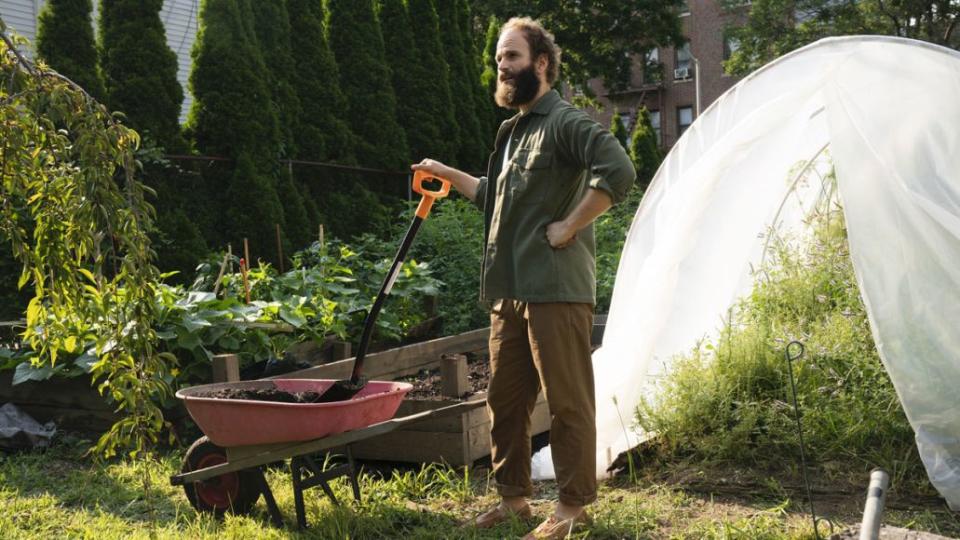
High Maintenance (HBO)
As the show progressed, The Guy became a more defined character, with multiple romantic partners and a complicated relationship with his family. But that hadn’t been the original plan.
Sinclair: I think it was Katja’s brilliant notion to know almost nothing about The Guy, keep him as a cipher. I wish more shows had the courage to give their main characters that kind of mystique, and let the audience do some of the imagining of their life story, instead of us just playing it out like a normal show.
Blichfeld: We did not have a journey planned for that character when we started this, in the beginning especially. And as it went on, we would sort of discuss how much we wanted to reveal about him and how much not to.
Sinclair: His name is a combination of my grandfathers’ names: My grandfather on my mom’s side is Max Mann, and on my dad’s side, it’s Rufus Sinclair. I wanted to name him Hugh Mann, but no one would let me do it, even though it was our show.
Blichfeld: He originally had a name when we wrote our first web episode, but then we edited it out. Because we thought, actually maybe it’s kind of cool if you just don’t know his name, and then when we end the show, maybe we’ll say his name.
Rufus’s name was in fact revealed in the Season 4 finale, “Soup” — the last produced episode of High Maintenance (to date).
Sinclair: At the end, I felt, to be honest, very resistant. I still think the show has more seasons in it, and to reveal his name felt like very much like the end. So I felt very emotional during that scene, because I was saying goodbye before I was ready. I had no idea that it would be such a… I wanted it to be an ellipsis on the sentence.

High Maintenance (HBO)
“Soup” premiered on April 3rd, 2020. You might not even remember that the show was airing that spring — after all, there was some other stuff going on around then.
Sinclair: As coronavirus came and HBO asked us how we wanted to go, we started having those conversations. The Guy went to New Zealand [at the end of Season 4] and I always felt like there would be a return to New York City. But then, the pandemic happened.
Blichfeld: We delivered our last episode [to HBO] just literally a few weeks before New York went into lockdown. And when the pandemic was first raging in the spring, that was typically the time we would have the conversation with HBO about renewals. We had already decided that we might like to step back.
Gregory: I think we all took a pause at the right time. Our show would’ve been so difficult to do during that pandemic because we’re so intimate, we’re so small, we’re so in each other’s faces and space. And it would’ve been very difficult. I mean, I couldn’t watch any of that Zoom stuff that happened — that wasn’t interesting to me.
Blichfeld: God, thinking about trying to capture what we were all feeling and seeing in New York at this moment — if we had to go do that in 2020, I think that by the time those episodes would’ve been released, they would have been totally cringe.
Sinclair: I believe that a lot of people said, “Oh, the only show I would accept covering COVID accurately would be High Maintenance. I remember hearing that from other creators during coronavirus. And I was like yeah, I agree. That would have been perfect.” The cost of it would have been really difficult. Just because of history, but also the circumstances of shooting during COVID just ups the ante and stress so much.
Rosenstein: I feel like the series was so ideally suited to re-watching during the pandemic and wonder if other fans felt the same way. Clearly, we could all relate to the sense of isolation and loneliness that were often a core part of the storytelling, but there was also this great sense of community. Watching people experience every day emotional ups and downs, and just trying to get through their days, that was comforting and relatable.
Another narrative challenge — or opportunity — for the series would be the increased legalization of marijuana across the United States.
King: The only thing I’d be curious about is, what’s The Guy’s life like now that everyone smokes weed and we can get it anywhere? To me, that’s the reason to bring it back, if you brought it back. Because I’m just curious what the show would be.
Buress: I mean, there’s always a lot of stories you tell in New York. He could be selling shrooms, microdoses, and different shroom drinks. It can even parallel with how things are going legal now. Does he run a shop now, you know? Or is he getting squeezed by the fact that it is going legal? There are still people that don’t want to get their weed from places. They want to just buy from a person.
King: I still get my weed from someone who brings it to me. It’s because I don’t trust dispensary weed in New York yet, you know? I’m not going to a bodega and getting weed where I don’t know where it came from. It’s a little bit different in LA and Portland, you know, places that have been doing this for some time.
“The Opportunity to Delve Deeper”
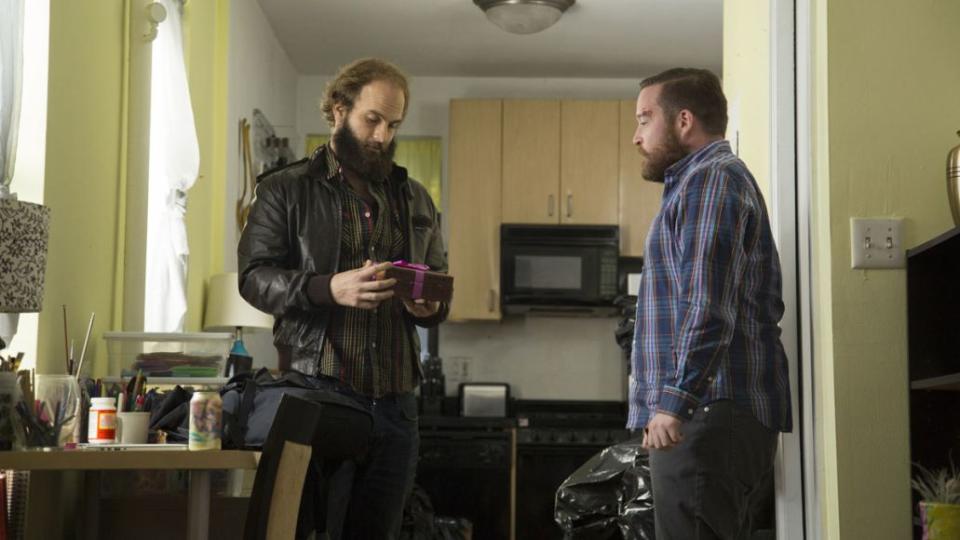
High Maintenance (HBO)
The show will be remembered for no shortage of reasons — such as the way it brought conversations not just about pot, but about identity and gender and sexuality, into the mainstream. But, making good on the show’s origins, it did give a wide range of actors a remarkable, perhaps life-changing, platform for their talents.
Sinclair: I have had actors come up to me and say, “Because of my role in High Maintenance, I got this part that changed my entire life.” Like William Jackson Harper, I believe his High Maintenance episode was submitted to get The Good Place, and now he’s in the Marvel universe. Britt Lower said that she landed Severance as a result of her work on High Maintenance — that’s what she reported to me.
Yorke: The funniest thing to me about High Maintenance is that I think it is a total accumulative amount of maybe six days of my entire life. And yet it is the reason for some of the most major, major jobs I’ve done since then. I think in my career now, the things I get the most comments on are High Maintenance or The Other Two. And I got The Other Two because of High Maintenance, because [co-creator Chris Kelly] had seen my episode.
Jenkins: Heléne and I are developing a show now, and everything we’re creating is based on the instantaneous bond we had, back when Russell Gregory first introduced us to each other on the first day of shooting “Olivia.” We’re out to lunch on that moment, every day of our lives! A life-defining moment.
Michael Cyril Creighton (Writer/”Patrick”): Patrick is forever one of my favorite characters that I’ve played because I feel like that’s when I hooked into the vulnerability that I have access to. Before that, it was a lot of snarky, sassy characters, which are fun to do, but High Maintenance gave me the opportunity to delve deeper.
Creighton’s career since appearing on the show has included critically-acclaimed appearances in the Best Picture-winning film Spotlight and the Hulu dramedy Only Murders In the Building.
Creighton: I don’t know if I would’ve gotten the opportunity to be seen for other types of roles had I not shown what I showed in High Maintenance. So I’m really thankful for that.
King, following the success of his 2021 film Judas and the Black Messiah, now has a first-look production deal at FX.
King: We’ve got a slate of 20-something shows, all at various stages of development. Some set up with [FX], some set up elsewhere. And then I have another movie I want to shoot and as early as probably 2024, end of 2023. So those are the things that I’m working on.
Where Are These Characters Today?
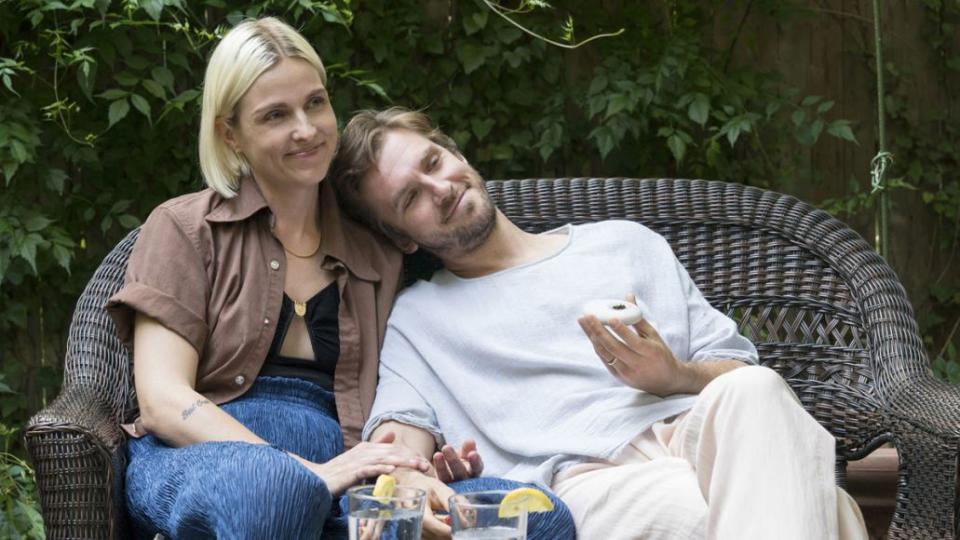
High Maintenance (HBO)
One of the qualities of High Maintenance that stands out, at least to this humble writer, is that because of its slice-of-life nature, so many of its characters feel like they’re still out there in the world, living their lives.
Blichfeld: I love that that’s how you think of it. I do too. It does feel like these people are still out there, their stories are continuing, and whether or not we actually officially ever go back and pick up those threads, I don’t know. There is sort of this quality to the way that we finished it where it does feel like it’s still alive, you know?
Rosenstein: I miss all of the characters and think about them all the time. I’ve concocted my own trajectories for many of them…and they’re living their lives in the best way possible (including Orly living her dream as a cast member of Stomp!).
Sinclair: I think that less is more [with The Guy in New Zealand], wondering what it was like for him out there. But I definitely have a running story in my own mind, especially during the pandemic, of what all of that looks like.
Creighton: If anyone was prepared for a lockdown, it was Patrick. He’s been getting groceries delivered & stress baking since 2013! I wish him only the best, so ideally the pandemic didn’t negate all the work he’s done to overcome his agoraphobia. In a perfect world, he got a dog, which forces him to get out of the house. He is selling his handmade theme wreaths and baked goods not only online but at pop-up markets around the city. He just got back from a trip to London with his boyfriend, where they saw Helen Hunt in a play and met her afterwards. He’s created a community for himself amongst some of the city’s most interesting crafters, bakers, and dog lovers. Every now and then he thinks about The Guy, and is so grateful for the time they had together.
Yorke: What I love about Max and Lainey is that the last time you see them, they are in these totally different places in their lives. The beat goes on and relationships change. But what I loved is that [Lainey’s] successful now. I think where I see her is where we left her, just building upon that success. That’s a boring answer, but I think that what’s interesting to me, is that while we change, we don’t change. Like, yes, we do better in life, but once a narcissist always a narcissist, and I think she’ll live in in that zone forever.
Jenkins: I would hope that the next moment we see of [Max] is as striking and lucid as the one in which he and Lainey shared a cab. Every time I walk by the Hare Krishna temple on Schermerhorn — the one with the delicious vegetarian lunch — I get lost in a thought spiral about him. I want more.
Is High Maintenance Really Over?
This is the official HBO statement about the show’s status, from January 2021: “Co-creators Katja Blichfeld and Ben Sinclair have decided to take a break from producing High Maintenance to pursue other projects. We look forward to hearing what they come up with next.”
Gregory: I think if Katja and Ben had an idea and came to me and we all were into it… That’s the only way I could see something happening. I can’t really see it anytime soon. Maybe sometime in the future. They’re both just doing so well on their own.
Sinclair: I still imagine a fifth season for the HBO incarnation of the show, but I’m not tempted to rush it by any means.
Blichfeld: I’ve lived long enough now to know, to never say never about anything, but [coming back] is hard to see, and it maybe gets harder with every passing year. I think I’m still wishing for myself to have the experience of creating something else, and putting that out there, before I would ever consider going back in time. I am developing a limited series right now that’s an adaptation of a book, and it’s been really luxurious to conceive of something that has this core cast of characters that you can dive deep into.
Sinclair: Throughout the course of this project, I’ve become a TV guy. I make TV now, I direct other people’s television project ideas. Recently, I’ve been returning back to that curiosity of form that I felt 10 years ago. This time in a slightly different medium: I’m trying to figure out how to make music compositions without a composer, and figuring out ways that non-musicians can make music together.
Essentially, I’ve been building a way to make music with others, instead of talking. My friend, a sound engineer, and I have been working on it for the past couple of weeks, really putting it into practice and it’s coming together. I hope that soon I’m able to share something. It comes back to that sense of play that we found when we first made the show. So recapturing that through another art form, such as music, makes me feel like the beginning of the High Maintenance days.
High Maintenance is streaming now on HBO Max.
High Maintenance Turns 10: An Oral History of HBO’s Pot-Scented Anthology Dramedy
Liz Shannon Miller
Popular Posts
Rick Ross Denies Being Hoarder While Showing Off Mansion Filled with Clothes and Shoes
Eminem Celebrates Rock and Roll Hall of Fame Induction: "I'm Probably Not Supposed to Be Here"
Joe Walsh on Honoring Taylor Hawkins, Reuniting James Gang, and Learning From Pete Townshend
Hozier on His New Song for God of War: Ragnarök, "Blood Upon the Snow": Exclusive

